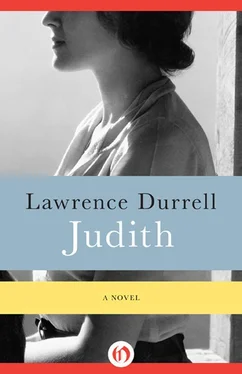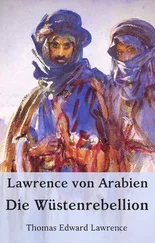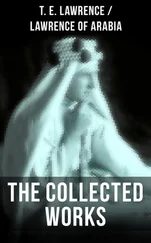“He was captured from Cairo last week. All his papers were destroyed.”
He smiled a weak, ingratiating smile.
The policeman crooked a huge finger at them and interposed with his heavy toneless voice:
“You come over here, you two, and sit down. Now I want to know your names and ’ow it ’appened.”
He had reverted to type — had become a country bobby again. He produced an indelible pencil and dabbed at his long pink tongue with it. The pencil left a purple mark in the centre of it. Laboriously he began to write.
Lawton watched for one second, consumed by an intense irritation and the feeling almost of despair.
“Was it really Günther Schiller?” he asked sharply.
And the two gaolers nodded. Then turning to the policeman, Lawton said:
“Well, Duff, I can leave the case to you, I take it. There’s nothing more for me to do here. I’ll be back at HQ if you want me.”
Duff nodded sagely, and Lawton re-entered the dark corridor, closing the door carefully behind him. When he was halfway down the staircase the dark window suddenly burst into a blaze of coloured light. For one wild moment he thought that someone was firing tracer bullets, and in his mind’s eye he saw the searchlights bracketing Tobruk harbour with a stream of molten rocket fire pouring up into the night sky.
“What the devil!” he said, and stopped to look out over Jerusalem. “Who the devil is sending up fireworks?”
Showers of golden drops slowly dispersed on the dark velvety skin of the night sky above the city. It was only when he reached the street that the explanation came to him. He heard the slow murmur of a crowd which was gathering in the street, the low murmur of chanting which was to swell gradually into a tumult of enthusiasm. While they had all been thinking about other things, Israel had been born.
Excited voices passed the news along the street. There was a tapping at shutters, tapping on doors. Voices cried: “UNO voted 33 to 13! We’ve won!” Some children raced along the street beating on saucepans with sticks, and chanting: “33 to 13, 33 to 13!”
Lawton found his duty driver crouched over the car radio, listening to the tail end of the BBC news.
“That’s done it, Sir,” he said. “They’ve won the UNO vote.”
Lawton didn’t reply, but climbed into the car with a dispirited air and allowed himself to be driven back to his office.
The thought of Grete afflicted him; he dreaded the coming interview. Mentally he rehearsed various ways of breaking the news to her, dismissing them one after the other as foolish or inadequate. Should he perhaps just walk in and say, “He’s dead and he’s taken his secret with him.” That would sound melodramatic. Or should he simply say, “I have bad news for you. Please remain calm.”
For a moment, hovering between these various possibilities, he was tempted to turn coward and ring her up. Nevertheless, he found himself at last opening the door of his office and confronting the figure that rose to meet him from the ugly leather armchair. He found that he did not need to speak. She divined everything from his expression. As he stood staring at her, she read his face with its expression of commiseration like a book.
“It’s something bad, isn’t it? What is it, is he dead?”
He nodded.
“Did the Jews…?” She stopped and bit her lip.
“Suicide,” said Lawton tersely, finding his voice. Then she echoed the word on a sharp, plaintive note. She had turned pale now and whispered:
“Did he leave any message?”
“None,” said Lawton bitterly. “Nothing. Not a trace.”
She swayed and he caught her by the forearm and put her firmly down in the armchair. Here she sat, staring in a dazed abstraction at the further wall, completely still, except that her fingers plucked and picked at a tassel on the chair.
Lawton, feeling all at once clumsy, crossed to his desk and from the bottom of it extracted a bottle of whisky and a siphon of soda. He mixed a stiff drink, and without a word put it into her hand. She raised it to her lips and her teeth chattered against the rim of the glass. Then suddenly she burst out:
“I can’t believe it!”
“Drink that up,” said Lawton.
He was walking up and down before her on the carpet now, slowly, like a monomaniac. His face looked lined and tired. Outside, the night sky above Jerusalem had begun to hiss and crackle and change colour. He drew the heavy curtains and they found themselves staring out on an extraordinary night panorama of light and smoke.
She did not appear to care enough to ask the cause of this explosion of coloured light. He took the glass from her hand, put it on the desk and said:
“Come, I’m going to take you home.”
She obeyed him like a somnambulist, and together they walked down the dark staircase of the office. He had forgotten to retain the duty car, but at the street corner they picked up one of those ancient horse-drawn carriages which still did duty for taxis in Jerusalem. She sat, her arm inside his, but completely silent as they drove through the streets of the old town, which were now filling up with eager and excited people. From the Arab quarter, however, there was a noise of counter-demonstrations and the harsh scratching of Radio Cairo calling for the death and destruction of the Jews.
Now and again in the winding streets of the town, under this canopy of light, the carriage was almost brought to a halt by surging crowds shouting good-naturedly to them, “33 to 13!” And here and there an excited Jew cried to Lawton, “Britain, go home!”
The girl sat absolutely still and white as death, hardly taking anything in, until at last they reached the flat. Her teeth had begun to chatter now and, as they climbed the stairs, Lawton put his hand on her forehead to see if she gave any signs of fever.
Once in the flat she threw herself onto the sofa and, giving one long wretched moan, buried her face in the cushions. Lawton stood watching her, undecided. He felt awkward, helpless, furious. Should he perhaps insist that she go to bed? He lit a cigarette and walked to the window.
“Grete,” he said, “will you try and get some sleep?”
She did not answer and, as he was staring irresolutely at her, he heard the crisp note of the doorbell. Who could be calling at this time of night? He threw up the window and strained forward. Outside the block of flats on the pavement stood a small attentive-looking figure in the white robes of a Dominican priest. It did not look up, perhaps because the noise of the fireworks had drowned the sound of the window being opened.
Lawton crossed with swift steps to the hall and pressed the button which would release the front door spring. Then he returned to the sitting-room and said:
“Grete, there’s a priest coming up the stairs. Do you know who he might be?”
She did not hear him, and he crossed the room to shake her by the shoulder as he repeated the phrase. She raised her white tormented face and said incoherently:
“What priest?”
And as if in answer to her question, Father Gaudier was suddenly there. He materialized, or so it seemed, in the doorway of the room, his small white hands clasped in front of him. He was breathing rather hard from his exertions. He uttered her name on a note of interrogation with a kind of child-like submissiveness. He was a small and rugged little man, with a round cropped head of the type which is designated Alpine by ethnographers. His dark hair was cut en brosse , his skin was brown and tanned. His eyes were of the bright blueness of periwinkles. His manner suggested simplicity without archness, and he darted swift interrogative glances from Grete to the soldier and back again to Grete, smiling his simple smile. It took a few seconds only to register his appearance, but already the girl had scrambled into a sitting posture and made a desultory attempt to arrange her hair.
Читать дальше












